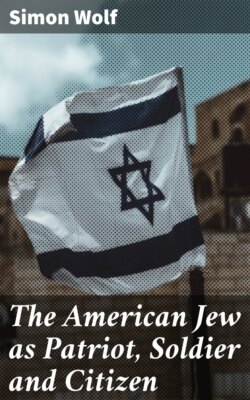Читать книгу The American Jew as Patriot, Soldier and Citizen - Simon Wolf - Страница 17
На сайте Литреса книга снята с продажи.
IV.
Some New York Jewish Patriots.
ОглавлениеTable of Contents
The number of New York Jews who served their country by risking life or fortune in its behalf is well-nigh legion. Hundreds upon hundreds of instances have been set forth from time to time, covering a time from the early colonial period, as appears particularly from another paper by the present writer, through the Revolutionary struggle down to our own day. But little cause can be assigned for distinguishing a few from the many in the present article unless it be the probability that the instances to be referred to herein are but little known. It should be of interest to notice, for instance, that the decision reached in 1770 to make more stringent the Non-Importation Agreement, which the colonists adopted to bring England to terms on the taxation question, had among its signers Samuel Judah, Hayman Levy, Jacob Moses, Jacob Myers, Jonas Phillips, and Isaac Seixas (New York Gazette and Weekly Post Boy, July 23, 1770).
The victory won by the Jewish Patriots over the loyalists in the New York Jewish Congregation at the outbreak of the Revolution, which induced the majority to determine to disband the congregation for country's sake, has been well described in a former article in our Society's periodicals and the names of the patriots who, in consequence, fled to Philadelphia on the approach of the British to New York are known. In another paper, the writer hereof enumerates some of the less known but possibly equally patriotic Jewish Loyalists, who remained in the city. It appears, however, that even the Jewish cemetery was to witness the strife and struggles of war, for we read that a battery to overlook the East River and prevent British ships from entering into it "is planned in some forwardness at the foot of the Jews' Burying Ground," in March, 1776. (N. Y. Hist. Soc. Collection Pub. Fund Series, Vol. III, pp. 354, 355).
During the war of 1812, the New York Jews appear to have again manifested their love of country, and one of their number, Col. Nathan Myers, was even in command of a brigade stationed near the City of New York in the beginning of the war. (Guernsey; "New York City during the War of 1812," pp. 86, 436–7). Others manifested their patriotism by bringing pecuniary sacrifices, as did Herman Hendricks in 1813. In February of that year, Congress passed an act authorizing a loan of $16,000,000, but less than $4,000,000 were subscribed. It was then that New York merchants came to the rescue by subscribing for the bonds, in spite of the sacrifices that were made in view of the fact that the government could not obtain money except at a discount of 15 per cent. Hendricks subscribed for $40,000 of the bonds, being one of the largest individual subscribers. (Scoville: The Old Merchant of New York City. First Series, pp. 329–333.)
Among those who served under Col. Myers in this War, was probably Samuel Noah, a cousin of Mordecai M. Noah, who led a most eventful life, which has been chronicled in a very interesting way by Gen. George W. Cullom in his "Biographical Sketches of Deceased Graduates of the United States Military Academy." We quote the account in full:
